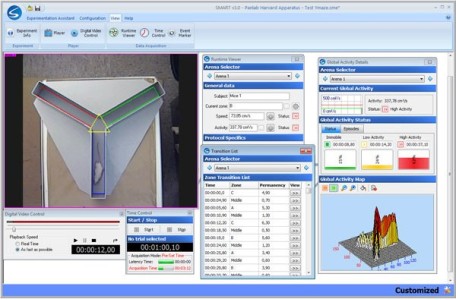Authors
Bourourou M, Heurteaux C, Blondeau N
Lab
Université de Nice Sophia Antipolis, IPMC, Sophia Antipolis, F-06560, France; CNRS, IPMC, Sophia Antipolis, F-06560, France
Journal
Neuropharmacology.
Abstract
Stroke is a leading cause of disability and death worldwide. Numerous therapeutics applied acutely after stroke have failed to improve long-term clinical outcomes. An emerging direction is nutritional intervention with omega-3 polyunsaturated fatty acids acting as disease-modifying factors and targeting post-stroke disabilities. Our previous studies demonstrated that the omega-3 precursor, alpha-linolenic acid (ALA) administrated by injections or dietary supplementation reduces stroke damage by direct neuroprotection, and triggering brain artery vasodilatation and neuroplasticity. Successful translation of putative therapies will depend on demonstration of robust efficacy on common deficits resulting from stroke like loss of motor control and memory/learning. This study evaluated the value of ALA as adjunctive therapy for stroke recovery by comparing whether oral or intravenous supplementation of ALA best support recovery from ischemia. Motor and cognitive deficits were assessed using rotarod, pole and Morris water maze tests. ALA supplementation in diet was better than intravenous treatment in improving motor coordination, but this improvement was not due to a neuroprotective effect since infarct size was not reduced. Both types of ALA supplementation improved spatial learning and memory after stroke. This cognitive improvement correlated with higher survival of hippocampal neurons. These results support clinical investigation establishing therapeutic plans using ALA supplementation.
BIOSEB Instruments Used
Smart 3.0 - Video Tracking System (SMART30)
Source :

 Pain - Thermal Allodynia / Hyperalgesia
Pain - Thermal Allodynia / Hyperalgesia Pain - Spontaneous Pain - Postural Deficit
Pain - Spontaneous Pain - Postural Deficit Pain - Mechanical Allodynia / Hyperalgesia
Pain - Mechanical Allodynia / Hyperalgesia Learning/Memory - Attention - Addiction
Learning/Memory - Attention - Addiction Physiology & Respiratory Research
Physiology & Respiratory Research











![Dynamic Weight Bearing 2.0 – Postural Module [Add-on]](https://bioseb.com/733-home_default/dynamic-weight-bearing-20-add-on-postural-module.jpg)
























 Pain
Pain Central Nervous System (CNS)
Central Nervous System (CNS) Neurodegeneration
Neurodegeneration Sensory system
Sensory system Motor control
Motor control Mood Disorders
Mood Disorders Other disorders
Other disorders Muscular system
Muscular system Joints
Joints Metabolism
Metabolism Cross-disciplinary subjects
Cross-disciplinary subjects CONFERENCES & MEETINGS
CONFERENCES & MEETINGS 